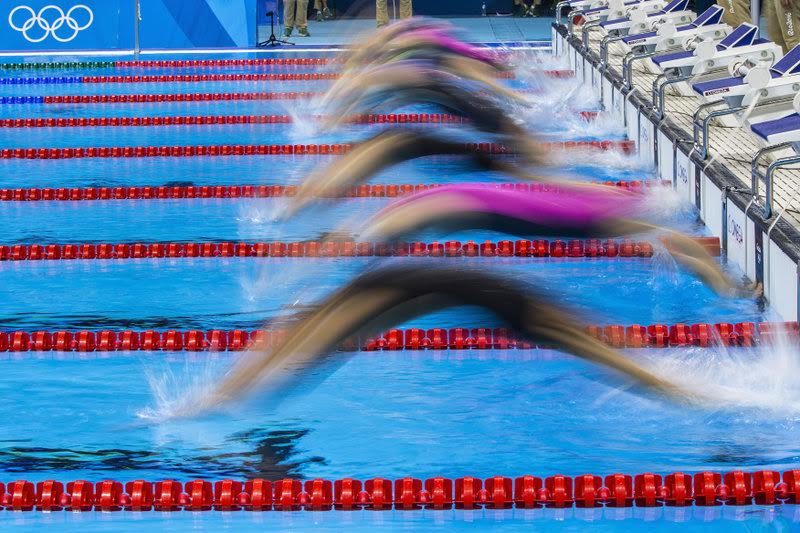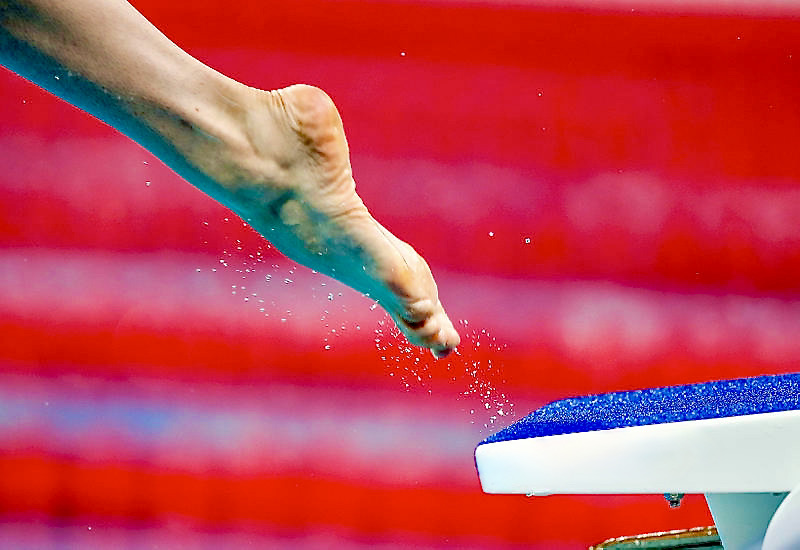Penn Women’s Swim Team Urges College/Ivy League Not To Sue NCAA & Back Fairness In Women’s Sport With Sex-Over-Gender Rules

In a letter penned by Nancy Hogshead-Makar, J.D., CEO of Champion Women, on behalf of 16 members of the Penn Women’s Swimming Team and their families, Penn and the Ivy League are asked today to sink all thoughts of suing the NCAA over its adoption of a new USA Swimming inclusion policy that would rule their transgender teammate Lia Thomas out of women’s racing at elite level.
Under the key action they seek – “We Request that Penn and the Ivy League Do Not Engage in Litigation to Alter the NCAA’s New Eligibility Guidelines for Transgender Athletes” – the women’s swim team and family urge Penn and the Ivy League to back a fundamental principle of sport categorisation: Sex must be the defining line, not gender choice, if fairness is to be served.
Hogshead-Makar, the 1984 Olympic swimming champion turned advocate for Safe Sport and women’s sport, writes on their behalf (letter in full at the foot of this article):

It has often felt like Penn, our school, our league, and the NCAA did not support us.
We have dedicated our lives to swimming. Most of us started the same time Lia did, as pre-teens. We have trained up to 20 hours a week, swimming miles, running and lifting weights. To be sidelined or beaten by someone competing with the strength, height, and lung capacity advantages that can only come with male puberty has been exceedingly difficult.
We have been told that if we spoke out against her inclusion into women’s competitions, that we would be removed from the team or that we would never get a job offer. When media have tried to reach out to us, these journalists have been told that the coaches and athletes were prohibited from talking to them. We support Lia’s mental health, and we ask Penn and the Ivy League to support ours as well.
16 members of Penn Women’s Team & Family – image: Lia Thomas, right, and her coach at UPenn Mike Schnur – screenshot courtesy of the Daily Mail
As the USA Swimming policy stands, Lia Thomas, record breaker in women’s racing travelling at a speed equivalent to world top 20 among women this season just two years after she raced as a he, a man travelling at a speed outside the world’s best 800, could only swim in NCAA competition from now on if she could show evidence that her testosterone levels had been below a specific level for at least 36 months, or three years. The USA Swimming policy also requires consideration of other male physiological measures that afford a distinct advantage over women in sport, though only in “elite” racing.
Penn and the Ivy League had backed lax NCAA rules that allowed Thomas to enter women’s swimming even though in many regards significant in sport, and despite her choice of identity, she remains male in key psychological ways, including genitalia.
While factions in the Ivy League are minded to challenge the NCAA over USA Swimming rules, some believe the USA Swimming rules are “a slap in the face to women”.
Christiana Holcomb, who serves as legal counsel for the Alliance Defending Freedom, provide a written statement to Outkick (the media outlet that spoke to experts about what the new NCAA position on transgender athletes meant for women) that included:

“Suppressing testosterone is hardly a remedy for fairness. Multiple studies demonstrate that no amount of testosterone suppression can undo a male’s physical advantages over females. Men still retain their bigger hearts and lungs, denser bones, stronger muscles, and larger skeletal structures.
Furthermore, USA Swimming’s new policy is a slap in the face to female swimmers at the non-elite levels and threatens their placement and advancement opportunities. No girl should be forced to compete against a male athlete.”
Christiana Holcomb
That view echoes those held by groups and individuals campaigning for women’s rights the world over (see Fond of Women’s Sport below). In the UK, such views have official backing, the UK Sports Council Equality Group having stated in a review last year that “for many sports, the inclusion of transgender people, fairness and safety cannot co-exist in a single competitive model”, further noting:

“… testosterone suppression is unlikely to guarantee fairness between transgender women and natal females in gender-affected sports … [there are] retained differences in strength, stamina and physique between the average woman compared with the average transgender woman or non-binary person registered male at birth”.
SCEG – image: keeping watch on the water – by Craig Lord
SOS Coverage On What Transgender Inclusion Means For Women’s Sport
- Fond Of Women’s Sport: Dr. Emma Hilton & The Science That Shows Why Biological Sex Not Gender Choice Says Who Swims As Man Or Woman + Links to comprehensive resources to the scientific research and lived experience that proves the case
- When Will Men Deciding What’s Best For Women Get It? Fairness In Swimming Is About Biological Sex Not Gender Choice
- Where Transgender Rights Trounce Women’s Rights To Fair Play In Sport
- A Waking Nightmare For Women’s Sport
The Penn Letter Penned By Nancy Hogshead-Makar – in full:

- To: The University of Pennsylvania and the Ivy League
- From: Nancy Hogshead-Makar, J.D., CEO of Champion Women, on behalf of 16 Members of the Penn Women’s Swimming Team and Their Families
- Date: February 3, 2022
- Re: We Request that Penn and the Ivy League Do Not Engage in Litigation to Alter the NCAA’s New Eligibility Guidelines for Transgender Athletes
We, 16 members of the Penn Women’s Swimming Team and our family members, thank USA Swimming, for listening to our request to prioritize fairness for biological women in our elite competitions. We ask that Penn and the Ivy League support us as biological women, and not engage in legal action with the NCAA to challenge these new Athlete Inclusion Policies.
Tuesday, USA Swimming released new “Athlete Inclusion Procedures” shortly after the NCAA acknowledged that each sport should determine how fairness and inclusion were to be accomplished.
In particular, we appreciate USAS Guideline’s guiding purpose, to ensure that transgender women competing in the Female competition category “do not have an unfair advantage over their cisgender Female competitors in Elite Events.” (USAS, page 42, #6 (a)).
We fully support Lia Thomas in her decision to affirm her gender identity and to transition from a man to a woman. Lia has every right to live her life authentically.
However, we also recognize that when it comes to sports competition, that the biology of sex is a separate issue from someone’s gender identity.
Biologically, Lia holds an unfair advantage over competition in the women’s category, as evidenced by her rankings that have bounced from #462 as a male to #1 as a female. If she were to be eligible to compete against us, she could now break Penn, Ivy, and NCAA Women’s Swimming records; feats she could never have done as a male athlete.
The Penn Women’s Swimming Team has over 40 women, but only 18 of us are chosen to compete in the end-of-year culmination of our work: the Ivy Championships.
Most important to us is that Lia’s inclusion with unfair biological advantages means that we have lost competitive opportunities. Some of us have lost records. But even those that swim different events than Lia or were not in contention to make the Ivy Championships, we stand by our teammates who have lost out. It has often felt like Penn, our school, our league, and the NCAA did not support us.
We have dedicated our lives to swimming. Most of us started the same time Lia did, as pre-teens. We have trained up to 20 hours a week, swimming miles, running and lifting weights. To be sidelined or beaten by someone competing with the strength, height, and lung capacity advantages that can only come with male puberty has been exceedingly difficult.
We have been told that if we spoke out against her inclusion into women’s competitions, that we would be removed from the team or that we would never get a job offer.
When media have tried to reach out to us, these journalists have been told that the coaches and athletes were prohibited from talking to them. We support Lia’s mental health, and we ask Penn and the Ivy League to support ours as well.
We hope that sport will adapt; that swimming will find a place for Lia to compete. Lia is always welcome to train with us; the men’s and women’s swimming teams have always trained together with the same head coach.
However, sport is competitive by definition, and Lia’s wins, records, and honors should not come at our expense, the women who have worked their entire lives to earn a spot on the Penn Women’s Swimming Team.
We just celebrated National Girls and Women in Sports Day. In honor of the Title IX pioneers who have worked so hard for women to have opportunities in sports and for educational opportunities for all women, we ask the University of Pennsylvania recognize the importance of providing fair competition and safe spaces for its biological female athletes.
Further, we ask that Penn and the Ivy League refrain from suing the NCAA, or try to interfere with or weaken these new Athlete Inclusion Policies, that they be allowed to stand, so that we are able to finish our swimming season with distinction and pride.